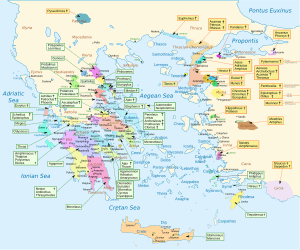Homer's Ithaca facts for kids
Ithaca (pronounced ITH-uh-kuh) was the island home of the famous hero Odysseus in Greek mythology. You might know Odysseus from Homer's epic poem, the Odyssey. In this story, Odysseus goes on a long journey home after the Trojan War.
Even today, people debate exactly where Homer's Ithaca was located. There are many ideas about its true spot. The island we call Ithaca today has traditionally been thought to be the same one from Homer's tales. However, some people suggest that Paliki, a part of Kefalonia, might have been the original island. They think it might have once been separated from the rest of Kefalonia by water. This idea is still being discussed and isn't widely accepted by experts.
Some people believe that famous characters like Odysseus, Achilles, and Agamemnon were just made-up characters. But others think they might have been real people. The Odyssey gives very detailed descriptions of places. This makes many wonder if these heroes truly existed and if their homes could be found.
Contents
Finding Homer's Ancient Places
A famous archaeologist named Heinrich Schliemann believed he could find the real places from Homer's stories. He worked hard to prove that these places were not just myths.
Schliemann's Discoveries
Schliemann's excavations suggested that Agamemnon lived at a place called Mycenae. He also proposed that the city of "Troy" really existed at a site called Hissarlik in modern-day Turkey. This was a big surprise to many people at the time!
Since then, many researchers have tried to find other places mentioned in Homer's epics. For example, they've looked for the palace of Nestor at Pylos. Finding these ancient sites has led to a lot of research, archaeological digs, and sometimes, disagreements among experts.
Where Was Homer's Ithaca?
People have been trying to find the exact location of "Homer's Ithaca" for a very long time. The first theories appeared around 200 BC, and new ideas are still being suggested today.
Each person who has looked for Ithaca has used different ways to search. Some used scientific methods, while others relied more on their beliefs or even imagination. It's interesting to see how these theories have changed over time. They show how much people have always been fascinated by Odysseus and his story.
Early Ideas About Ithaca
Here are some of the early thinkers who tried to pinpoint Homer's Ithaca:
- Eratosthenes (276 BC – 194 BC)
- Demetrius of Scepsis (mid-2nd century BC)
- Apollodorus of Athens (born around 180 BC)
- Strabo (63/4 BC – around 24 AD)
Modern Theories and Searches
Many people in more recent times have also searched for Homer's Ithaca:
- William Gell (1807) thought it was on the Aetos isthmus of Ithaki island.
- William M. Leake (1835) believed it was on the northwestern coast of Ithaki island.
- Théophile Cailleux (1878) had a very different idea, placing "Ithaca" in south-west Spain!
- Samuel Butler (1897) had a controversial theory. He thought the Odyssey was written by a young Sicilian woman. He believed the poem's scenes were based on the coast of Sicily.
- Wilhelm Dörpfeld (1853 – 1940) did a lot of digging on Ithaca and Lefkada. He suggested Odysseus's palace was on Lefkada.
- G. Volterras (1903) thought Paliki might have once been separated from Kefalonia by a channel.
- A.E.H. Goekoop (1908) believed "Ithaca" was in southwestern Kefalonia.
- Lord Rennell of Rodd (1927) thought "Ithaca" was on Ithaki island.
- W.A. Heurtley and Sylvia Benton also believed "Ithaca" was on Ithaki. They found ancient artifacts there.
- C.H. Goekoop (1990), grandson of A.E.H. Goekoop, thought "Ithaca" was in northern Kefalonia.
- J.V. Luce (1998) believed "Ithaca" was on Ithaki island.
- Henriette Putman Cramer and Gerasimos Metaxas think the center of Homeric Ithaca was in south-east Kefalonia, near Poros.
- Gilles Le Noan (1989-2005) suggested Paliki as the location.
- Christos Tzakos (1999-2005) believed "Ithaca" was on Ithaki island.
- Robert Bittlestone, James Diggle & John Underhill (2003) also believe Paliki is the location. They think a channel once separated it from Kefalonia, as described in their book Odysseus Unbound.
- Felice Vinci suggests that many Homeric places can be found in the Baltic Sea region.
- Jonathan Brown traveled to many places, including Cephalonia, Lefkada, and Sicily. After his travels, he concluded that Ithaca was on Ithaki island.
See also
 | Aurelia Browder |
 | Nannie Helen Burroughs |
 | Michelle Alexander |



